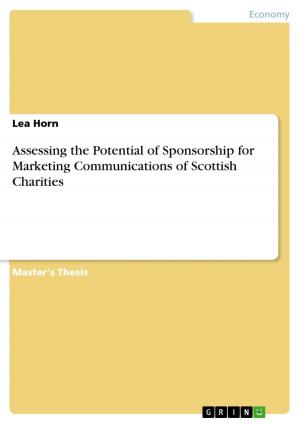| Author: | Kirsten Nath | ISBN: | 9783638726023 |
| Publisher: | GRIN Verlag | Publication: | June 6, 2007 |
| Imprint: | GRIN Verlag | Language: | English |
| Author: | Kirsten Nath |
| ISBN: | 9783638726023 |
| Publisher: | GRIN Verlag |
| Publication: | June 6, 2007 |
| Imprint: | GRIN Verlag |
| Language: | English |
Seminar paper from the year 2007 in the subject American Studies - Literature, grade: 1,0, University of Hamburg (Anglistik und Amerikanistik), course: Holocaust in American Art, 23 entries in the bibliography, language: English, abstract: My analysis in this paper will begin with a short description of Elie Wiesel's life since it plays an important role in most of his stories, especially in his early works (later he tried to avoid autobiographical similarities). According to Wiesel, he only writes as a witness and because he is a witness; that is why lots of autobiographical information can be found in his stories - even if it becomes less obvious in his later works. Wiesel's main protagonists are mostly similar to the young Elie: they are making or have made comparable experiences before, during, and after the Holocaust; they come from the same little town and live in the same places, such as Paris, New York, and the USA. The characters and the outcome of each story reveal Wiesel's thoughts and opinions. In the second part of this paper, I will investigate Wiesel's understanding of madness. This will clarify the importance of madness for Elie Wiesel and it will show that, for Wiesel, madness is much more than just a mental disorder in the common sense. Having given some insight into Wiesel's past and in his comprehension of madness, I will turn to the actual analysis of the four novels. I will examine the madmen, madwomen, and other occurrences of madness in each novel, and interpret my results regarding their respective function. In my conclusion, I will show that there are several functions of madness in Wiesel's novels: he wants to show us that in our insane world faith, even if it sometimes seems like sheer madness too, is important to survive and to overcome insanity.
Seminar paper from the year 2007 in the subject American Studies - Literature, grade: 1,0, University of Hamburg (Anglistik und Amerikanistik), course: Holocaust in American Art, 23 entries in the bibliography, language: English, abstract: My analysis in this paper will begin with a short description of Elie Wiesel's life since it plays an important role in most of his stories, especially in his early works (later he tried to avoid autobiographical similarities). According to Wiesel, he only writes as a witness and because he is a witness; that is why lots of autobiographical information can be found in his stories - even if it becomes less obvious in his later works. Wiesel's main protagonists are mostly similar to the young Elie: they are making or have made comparable experiences before, during, and after the Holocaust; they come from the same little town and live in the same places, such as Paris, New York, and the USA. The characters and the outcome of each story reveal Wiesel's thoughts and opinions. In the second part of this paper, I will investigate Wiesel's understanding of madness. This will clarify the importance of madness for Elie Wiesel and it will show that, for Wiesel, madness is much more than just a mental disorder in the common sense. Having given some insight into Wiesel's past and in his comprehension of madness, I will turn to the actual analysis of the four novels. I will examine the madmen, madwomen, and other occurrences of madness in each novel, and interpret my results regarding their respective function. In my conclusion, I will show that there are several functions of madness in Wiesel's novels: he wants to show us that in our insane world faith, even if it sometimes seems like sheer madness too, is important to survive and to overcome insanity.















